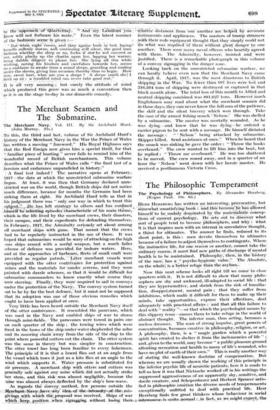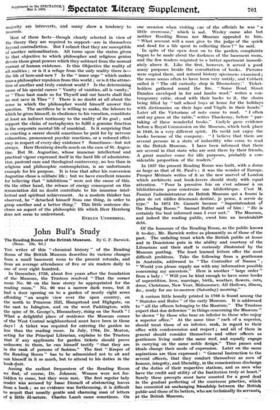The Philosophic Temperament HERR HERZBERG has written an interesting, provocative,
but "somewhat unsatisfying-book becie-kieheNii allowed • himself to be_unduly dominated by the materialistic concep- tions of current. psychology., He sets out to diseiiVer what sort of people tend to become fahiloapbers, and-4h3r.: what it is that inspires men with an interest in speculative thought, a thirst for ultimates. The answer he finds, reduced to its short point, is this : men devote themselves to ultimates because of a failure to.adjust,themselyes to contingents... Where the instinctive life, for one reason or anothei, cannot take the ordinarY'eeurte, it must find new paths of discharge-if mental health is to be maintained. Philosophy; then: in the-history of the race; has a " psycho-hygienic value." The Absolute, on the whole; is a-hettei refuge than the asylum.. •
.. Now this neat scheme looks all right till we come to close
quarters with it. It is not difficult to show that many philo- sophers are shy and awkward, ill-adapted to social life : that they are hypersensitive, and shrink from the risk of humilia- tion, disappointment, mental pain ; that they suffer from inhibitions, which make it difficult for them to make up their minds, take opportunities, express their affections, deal 'adequately with practical affairs :- and that all this failure to deal with " reality "—or that which the psychologist means by this slippery term—causes them to take refuge in the world of abstract thought. The inferior man, thus acting, becomes a useless dreamer. The man of strong impulse, great powers of concentration, 'becomes creative in philosophy, religion, or art. A philosophy, then, is a " magic garden which a powerful spirit has created to shelter it frein the incleriaencies of life " ; and, given to the world; may become " a public pleasure ground affording recreation and health to many of fifes wounded, who have no plot of earth of their own." This is really another way of stating the well-known doctrine of compensation. But whereas we are usually shown the working-Of this principle in the inferior psychic life of neurotic patients, here it is made to tell us how it was that Nietzsche worked off in his writings the suppressed aggressiveness of an apparently shy, sensitive, and docile creature, and Schopenhauer and Herbert Spencer satis- fied in philosophic creation the diverse needs of temperaments exceptionally unfitted to deal with practical life. Herr Herzberg finds few great thinkers whose behaviour in social .4ritemoarse.is- quite normal : in fact, as we might expect, the
majority are introverts, and many show a tendency to neurosis.
Most of these facts—though clearly selected in view of the theory they are required to support—are in themselves beyond contradiction. But I sullmit that they are susceptible of another rationalization. All turns upon the -status given to that objective to which philosopher and religious genius devote those great powers which they subtract from the normal current of human existence. Is this Objective the reality of all realities ; or is it a refuge from the only reality there is— the life of here-and-now ? Is the " inner urge " which makes man a philosopher repulsion from this world ; or is it the attrac- tion of another and truly existent world ? Is the determining cause of his special career " Vanity of vanities, all is vanity," or " Thou hest made us for Thyself and our hearts shall find no rest save in Thee " ? There is no doubt at all about the sense in which the philosopher would himself answer this question. The sacrifices he is willing to make, the labours to which he gives himself, in obedience to his vocation, constitute at least an indirect testimony to the reality of its goal ; and support the claim of metaphysics to fulfil a genuine function in the corporate mental life of mankind. Is it surprising that so exacting a career should sometimes be paid for by nervous exhaustion, pronounced psychic reactions, or a reduced effici- ency in respect of every-day existence ? Sometimes—but not always. Herr Herzberg dwells much on the case of St. Augus- tine. But St. Augustine, whose immense intellectual and practical vigour expressed itself in the hard life of administra- tion, pastoral care and theological controversy, no less than in religious and philosophic ..contemplation, is an unfortunate example for his purpose. It is true that after, his conversion Augustine chose a celibate life ; but we have excellent reasons for believing that " inhibitions " were not the cause of this.
On the other hand, the release of energy consequent on this renunciation did no 'doubt contribide to his immense intel= lectual and spiritual achievement. As a modern thinker has observed, he " detached himself from one thing, in order to grasp another and a better thing." This little sentence dis- closes an aspect of the philosophic life which Herr Herzberg does not seem to understand.
EVELYN UNDERHILL.























































 Previous page
Previous page